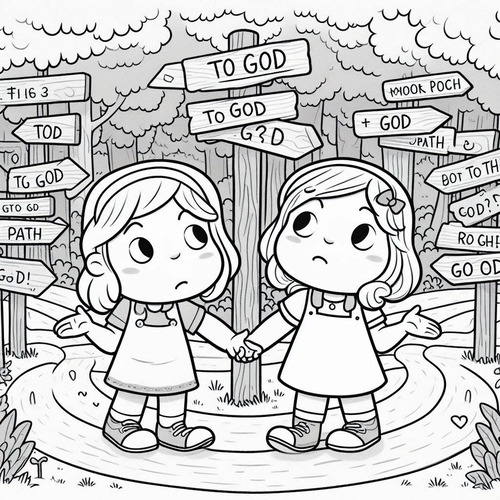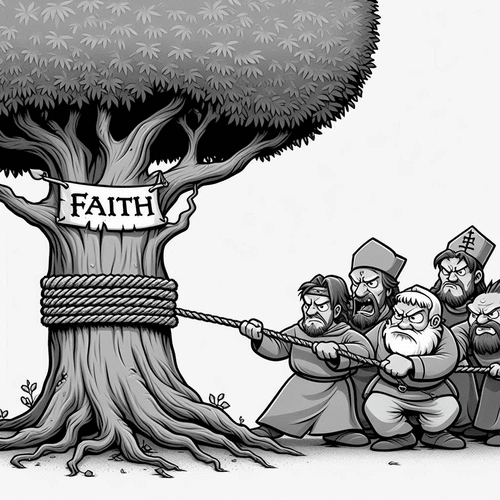Life’s Biggest Questions: The Bible Alone Has Answers
Life’s Profoundest Questions: Soul-satisfying Answers
As human beings, we’re haunted by questions: about our origins, purpose, and ultimate destiny. Where did we come from? What is the meaning of life? How can we know right from wrong? Is there freedom from guilt and the power of sin? Can we find lasting joy and peace? What happens after we die? These profound questions have echoed through the ages, as every generation wrestles with the weight of life’s mysteries. In our endless pursuit of truth and meaning, one book emerges as a solitary beacon amidst the darkness—the Bible. Join us as we ponder life’s profoundest questions, and the Bible’s soul-satisfying answers…
- The Question of Origin: Where Did I Come From?
“In the beginning God created the heavens and the earth.”—Genesis 1:1
The Bible provides the best answer on the question of our origin: it reveals an intelligent, all-powerful Creator purposefully crafted the universe. Moreover, He created us, human beings, in His image. This contrasts with other what other worldviews suggest:
- Naturalism: We’re cosmic accidents, products of matter, time, and chance.
- Some faiths: The universe cycles through creation, preservation, and destruction.
- Others: The answer is unknowable or irrelevant.
The biblical account imbues our lives with profound significance. It not only resonates with our innate desire for meaning—it also aligns with scientific observations that leave room for intelligent design, which many argue is the best explanation for the complexity and fine-tuning we observe in the universe. What’s more, being made in God’s image gives our lives significance, purpose, and hope—all of which are unmatched by materialistic worldviews.
- The Question of Meaning: How Do I Find Meaning in Life?
“The Lord has made everything for its own purpose.”—Proverbs 16:4
Each worldview offers its own perspective on life’s meaning: Secular humanism suggests meaning is arbitrary and self-defined. Some philosophies argue we create our own meaning. Buddhist traditions often view life’s ultimate meaning in terms of enlightenment and liberation from suffering. Hindu philosophy generally sees life’s purpose as achieving moksha, or liberation from the cycle of rebirth.
The Bible, however, provides a profound and satisfying answer. As beings created in the image of God Himself, our lives are infused with intrinsic worth and an eternal purpose. True meaning is found in a loving relationship with our Creator and walking in obedience to His will. The Bible grounds our purpose in the greatest commandment—to love God with all our heart, soul, and mind, and to love our neighbours as ourselves (Matthew 22:37-39). Christian traditions also emphasise we must discover and use our unique gifts and talents to glorify God and contribute to His kingdom. We are to seek spiritual growth: continuously striving to become more Christ-like in our character and actions. And we are to share the gospel: participate in God’s plan of redemption by sharing the good news of salvation with others.
The Bible thus offers a holistic approach that addresses our spiritual, relational, and purposeful needs. It provides a framework for living that is both deeply personal and universally applicable, giving our lives direction, hope, and lasting significance that goes beyond mere self-fulfilment or temporary pursuits.
- The Question of Morality: How Do I Know Right from Wrong?
“Your word is a lamp to my feet and a light to my path.” – Psalm 119:105
Amidst the shifting sands of human philosophies, the Bible grounds morality in the unchanging nature and holiness of God Himself. As those made in God’s image, we have the capacity to discern right from wrong by aligning our thoughts and actions with His perfect, eternal standard.
What’s more, the Holy Spirit who indwells believers acts as an ever-present guide, convicting our hearts and illuminating the clear moral precepts found in Scripture. This transcendent source of moral clarity is simply unparalleled. Thus, the Bible offers an adequate answer to another of life’s profoundest questions.
- The Question of Justification: Can I Be Free from the Guilt of Sin?
“If we confess our sins, he is faithful and righteous to forgive us our sins and to cleanse us from all unrighteousness.”—1 John 1:9
The weight of guilt is a universal burden that every human soul has felt. Some Eastern religions propose karma and reincarnation as means of balancing moral accounts. Certain philosophies suggest sacrifice or penance as ways to atone for wrongdoing. Secular perspectives even argue guilt is merely a social construct without inherent meaning. Certain schools of psychology view guilt as an unhealthy emotion to be overcome through therapy or self-acceptance.
While other religions require endless deeds to attain potential redemption, the Bible reveals the radical truth that God Himself provided the once-and-for-all solution through Christ’s sacrifice. The Bible’s offer, of what it calls justification, is unique: God Himself initiates reconciliation, instead of us working our way to God. He reaches out to us. When we repent and place our faith in Jesus, we are immediately forgiven and cleansed. Our slate is wiped clean. The crushing guilt is lifted as our slate is wiped clean, allowing us to experience profound spiritual renewal and a fresh start. When we embrace this truth, the crushing weight of guilt is lifted, allowing us to experience profound spiritual renewal and a fresh start.
- The Question of Sanctification: Can I Be Free from the Power of Sin?
“He who began a good work in you will perfect it until the day of Christ Jesus.”—Philippians 1:6
Each worldview offers its own approach to personal transformation: some self-help therapies suggest personal effort and willpower as the key to change. Psychology often proposes behaviour modification techniques to alter harmful patterns. Certain philosophical perspectives argue we must accept flaws as an inherent part of human nature.
However, the Bible offers a unique and powerful answer to what it calls the question of sanctification—as it does to all of life’s profoundest questions. Not only does it offer freedom from sin’s guilt, it also empowers believers to overcome sin’s entrenched patterns and grip through the indwelling power of the Holy Spirit. Change is not solely dependent on human effort but on God’s power working within us. The Holy Spirit addresses not just our behaviour, but also our heart and mind. Sinful habits, negative mindsets, and toxic behaviour are replaced by the fruit of the Spirit—love, joy, peace, patience, self-control. Sanctification is an ongoing process of becoming more like Christ.
- The Question of Joy and Peace: Can I Ever Find Lasting Joy and Peace?
“You will keep the mind that is dependent on you in perfect peace, for it is trusting in you.”—Isaiah 26:3
Materialism suggests possessions or experiences can bring lasting happiness. Some philosophies, including certain schools of Buddhism, advocate detachment from desires as the path to inner peace. Psychologists often propose mental techniques for managing emotions and achieving a sense of well-being.
The Bible, however, reveals a unique and profound source of joy and peace. In Christianity, these are not peripheral benefits but central aspects of the believer’s life, flowing directly from our intimate relationship with God Himself. This joy and peace surpass circumstances, remaining steady even in turbulent times. They stem from a connection with God, not from human effort or external factors. While joy and peace are often peripheral in other worldviews, they are central to the Christian experience. Christians can attest that their joy and peace transcend circumstances, rooted in God’s unchanging love. Sorrow becomes peripheral while joy and peace take centre stage. This is the secret to a life brimming with profound contentment and purpose, no matter what challenges arise—a depth of experience that other worldviews struggle to match.
- The Question of Destiny: Where Will I Go After I Die?
“For God so loved the world that He gave His only Son, that whoever believes in Him shall not perish but have eternal life.”—John 3:16
Though the finality of death has haunted humanity since the beginning of time, atheism suggests there is no afterlife; only cessation of existence. Some Eastern religions propose reincarnation or cycles of birth and rebirth. Certain philosophies argue our destiny is unknown and unknowable.
The Bible alone provides a profoundly hopeful answer—a glorious eternal destiny awaits all who place their faith in Jesus Christ as Lord and Saviour. It offers clear teachings about the afterlife, unlike philosophies that claim it’s unknowable. It promises eternal life, contrasting with atheism’s view of cessation. Unlike reincarnation, it affirms the preservation of individual identity. What’s more, it promises eternal fellowship with God, not just an impersonal state of being.
By God’s grace through Christ, death is no longer a looming darkness, but a gateway into everlasting light and life in heaven with our Creator. The fear of the grave is replaced by an eager, joyful anticipation of an eternal homecoming in the loving presence of God. The Bible alone prepares believers for a peaceful death, offering comfort and assurance.
Only the believer in Christ can face death with genuine confidence and hope.
Life’s Profoundest Questions: Answers, Anyone?
While other philosophies and religions offer partial insights, the Holy Bible stands alone in providing soul-satisfying clarity and coherent answers to the deepest longings we all share as human beings. If your worldview still leaves you unsettled about life’s profoundest questions, perhaps it’s time to carefully investigate the Bible’s truth claims before it’s too late.
Related Reads
Editor's Pick

The Throne-Room Vision: Who Did Isaiah See?
The scene is unforgettable: Isaiah stands in the temple, and suddenly the veil between heaven and earth tears open. He [...]

The Angel of the Lord: Can We Be Certain It Was Christ All Along?
Throughout the Old Testament, a mysterious figure appears: the Angel of the LORD. He speaks as God, bears God’s name, [...]
SUPPORT US:
Feel the Holy Spirit's gentle nudge to partner with us?
Donate Online:
Account Name: TRUTHS TO DIE FOR FOUNDATION
Account Number: 10243565459
Bank IFSC: IDFB0043391
Bank Name: IDFC FIRST BANK






